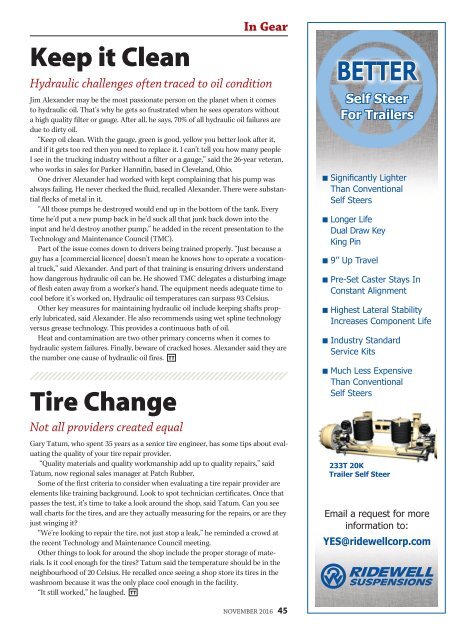DIGGING IN
2faRCNO
2faRCNO
You also want an ePaper? Increase the reach of your titles
YUMPU automatically turns print PDFs into web optimized ePapers that Google loves.
In Gear<br />
Keep it Clean<br />
Hydraulic challenges often traced to oil condition<br />
Jim Alexander may be the most passionate person on the planet when it comes<br />
to hydraulic oil. That’s why he gets so frustrated when he sees operators without<br />
a high quality filter or gauge. After all, he says, 70% of all hydraulic oil failures are<br />
due to dirty oil.<br />
“Keep oil clean. With the gauge, green is good, yellow you better look after it,<br />
and if it gets too red then you need to replace it. I can’t tell you how many people<br />
I see in the trucking industry without a filter or a gauge,” said the 26-year veteran,<br />
who works in sales for Parker Hannifin, based in Cleveland, Ohio.<br />
One driver Alexander had worked with kept complaining that his pump was<br />
always failing. He never checked the fluid, recalled Alexander. There were substantial<br />
flecks of metal in it.<br />
“All those pumps he destroyed would end up in the bottom of the tank. Every<br />
time he’d put a new pump back in he’d suck all that junk back down into the<br />
input and he’d destroy another pump,” he added in the recent presentation to the<br />
Technology and Maintenance Council (TMC).<br />
Part of the issue comes down to drivers being trained properly. “Just because a<br />
guy has a [commercial licence] doesn’t mean he knows how to operate a vocational<br />
truck,” said Alexander. And part of that training is ensuring drivers understand<br />
how dangerous hydraulic oil can be. He showed TMC delegates a disturbing image<br />
of flesh eaten away from a worker’s hand. The equipment needs adequate time to<br />
cool before it’s worked on. Hydraulic oil temperatures can surpass 93 Celsius.<br />
Other key measures for maintaining hydraulic oil include keeping shafts properly<br />
lubricated, said Alexander. He also recommends using wet spline technology<br />
versus grease technology. This provides a continuous bath of oil.<br />
Heat and contamination are two other primary concerns when it comes to<br />
hydraulic system failures. Finally, beware of cracked hoses. Alexander said they are<br />
the number one cause of hydraulic oil fires. TT<br />
Tire Change<br />
Not all providers created equal<br />
Gary Tatum, who spent 35 years as a senior tire engineer, has some tips about evaluating<br />
the quality of your tire repair provider.<br />
“Quality materials and quality workmanship add up to quality repairs,” said<br />
Tatum, now regional sales manager at Patch Rubber.<br />
Some of the first criteria to consider when evaluating a tire repair provider are<br />
elements like training background. Look to spot technician certificates. Once that<br />
passes the test, it’s time to take a look around the shop, said Tatum. Can you see<br />
wall charts for the tires, and are they actually measuring for the repairs, or are they<br />
just winging it?<br />
“We’re looking to repair the tire, not just stop a leak,” he reminded a crowd at<br />
the recent Technology and Maintenance Council meeting.<br />
Other things to look for around the shop include the proper storage of materials.<br />
Is it cool enough for the tires? Tatum said the temperature should be in the<br />
neighbourhood of 20 Celsius. He recalled once seeing a shop store its tires in the<br />
washroom because it was the only place cool enough in the facility.<br />
“It still worked,” he laughed. TT<br />
BETTER<br />
Self Steer<br />
For Trailers<br />
<br />
<br />
<br />
<br />
<br />
<br />
<br />
<br />
<br />
<br />
<br />
<br />
<br />
<br />
<br />
<br />
233T 20K<br />
Trailer Self Steer<br />
<br />
<br />
YES@ridewellcorp.com<br />
NOVEMBER 2016 45


